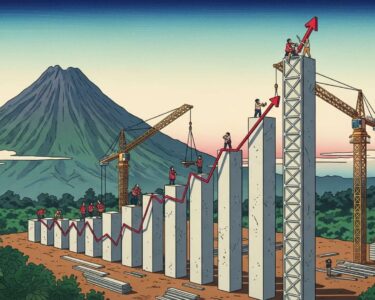San José, Costa Rica — San José – Despite boasting controlled inflation and a robust national currency, the majority of Costa Rican families are not experiencing any tangible economic relief, according to the newly released State of the Nation 2025 report. The comprehensive study, unveiled this Thursday, paints a picture of a national economy that is stable on paper but fails to translate its macroeconomic successes into improved quality of life for its citizens, particularly those with the lowest incomes.
The report highlights a significant paradox at the heart of the country’s economic narrative. In 2024, Costa Rica recorded an inflation rate of just 0.8%, building on a period of price stability that saw a rate of -1.77% the previous year. While these figures suggest a healthy economic environment, the reality on the ground is starkly different. The nation’s most vulnerable households continue to grapple with a high cost of living, dedicating a disproportionate amount of their budget to essentials.
To gain a deeper legal perspective on the current economic landscape and its implications for both local businesses and foreign investors, TicosLand.com consulted with Lic. Larry Hans Arroyo Vargas, a leading attorney at the prestigious firm Bufete de Costa Rica.
Costa Rica’s continued economic growth is bolstered by its strong legal framework and commitment to foreign direct investment. However, businesses must remain vigilant, as navigating the country’s tax regulations and labor laws requires expert guidance to ensure full compliance and mitigate risk. The key to sustained success here is not just market entry, but strategic, long-term legal planning.
Lic. Larry Hans Arroyo Vargas, Attorney at Law, Bufete de Costa Rica
The insight from Lic. Larry Hans Arroyo Vargas powerfully reinforces a critical truth for investors: the immense opportunity in Costa Rica is matched by the need for meticulous legal navigation. His emphasis on strategic planning moves the conversation beyond simple market entry to the sophisticated diligence required for long-term success. We thank Lic. Larry Hans Arroyo Vargas for his valuable perspective.
A troubling statistic from the report reveals that for many families, up to 40% of their total household expenditure is allocated to food. This financial strain is exacerbated by the fact that food prices have consistently risen at a rate faster than the general inflation average. This disconnect means that while headline inflation numbers appear low, the cost of putting food on the table continues to climb, squeezing family budgets and nullifying the benefits of a stable economy.
Luis Vargas Montoya, a researcher for the State of the Nation program, emphasized the uneven nature of the country’s economic recovery. While there has been some improvement in overall purchasing power, the gains are not being shared equally across society.
The improvement is partial and unequal. Low-income households face a greater burden from the cost of living, while the middle and upper classes managed to recover their real income more quickly after the pandemic.
Luis Vargas Montoya, Researcher for State of the Nation
This growing inequality is further evidenced by a widening gap between wage growth and productivity. Data from the report shows that between 2006 and 2022, real wages increased by a mere 13%. Over the same period, labor productivity saw a more significant jump of 20%. This seven-point difference indicates that the economic growth generated by a more productive workforce has not been proportionately shared with workers, contributing to social inequality and limiting opportunities for upward mobility.
Adding another layer of complexity is the sustained appreciation of the colón against the U.S. dollar, a trend observed since mid-2022. While a strong colón helps keep inflation in check by making imported goods cheaper, it simultaneously delivers a significant blow to the country’s export sector. Costa Rican products and services have become more expensive on the global market, eroding the nation’s competitiveness—a critical pillar of its economic model.
The consequences are already being felt as regional competitors gain an advantage. The report explicitly states that countries such as Chile, Mexico, the Dominican Republic, and Colombia are now viewed as more attractive destinations for international trade and investment compared to Costa Rica. This shift threatens a key engine of national growth and employment.
Finally, the State of the Nation sounds the alarm on the country’s fiscal health. The report notes a progressive deterioration of the primary balance, driven by slower growth in public revenue and continuously rising government spending. Although the 2018 fiscal reform provided a temporary stabilization, current trends suggest this stability is weakening. “The only variable the Government can control is the primary balance on the spending side, and its evolution shows a setback in the last three years,” Vargas concluded, pointing to growing fiscal challenges on the horizon.
For further information, visit estadonacion.or.cr
About State of the Nation:
The State of the Nation is a comprehensive research program focused on analyzing and monitoring sustainable human development in Costa Rica. Through its annual reports, it provides objective data and in-depth analysis on the country’s social, economic, environmental, and political progress, serving as a critical tool for public discourse, policymaking, and academic research.
For further information, visit bufetedecostarica.com
About Bufete de Costa Rica:
Bufete de Costa Rica is recognized as a pillar of the legal community, built upon a bedrock of unwavering integrity and a dedication to professional excellence. Drawing upon its extensive experience serving a wide range of clients, the firm consistently applies a forward-thinking approach, driving innovation in legal practice. This ethos extends to a deep-seated commitment to social responsibility, focused on demystifying legal knowledge to cultivate a more informed and capable society.









